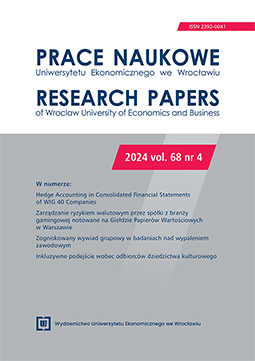Hedge Accounting in the Consolidated Financial Statements of WIG 40 Companies
DOI:
https://doi.org/10.15611/pn.2024.4.01Keywords:
hedge accounting, derivative financial instruments, hedge effectiveness, financial performanceAbstract
Purpose: To check whether WIG 40 companies apply hedge accounting, and if so, do the effects of applying hedge accounting significantly affect the financial performance of these companies? Does hedge accounting improve the efficiency of operations by WIG-40 companies?
Methodology: The article uses the following research methods: literature review, analysis of legal acts related to hedge accounting, verification of consolidated financial statements.
Results: The results show that a significant portion of WIG-40 companies do not apply hedge accounting.
Implications and recommendations: It is recommended to conduct further research related to hedge accounting for a larger number of companies listed on the Stock Exchange, and try to answer the question of what is the reason for the lack of application of hedge accounting on a larger scale.
Originality/value: The article verified the use of hedge accounting and its impact on the financial statements of the WIG-40 companies studied.
Downloads
References
Ali, W., Bens, D. A., & Cassar, G. (2023). Does Hedge Accounting Complexity Influence the Effectiveness of Firms' Hedging Activities? INSEAD The Business School for the World, Working Paper 2023/61/ACC.
Campbell, J. L., Mauler, L. M., & Pierce, S. R. (2019). A Review of Derivatives Research in Accounting and Suggestion for Future Work. Journal of Accounting Literature, 42, 44-60.
Commission Regulation (EC) No 1126/2008 of 3 November 2008 adopting certain international accounting standards in accordance with Regulation (EC) No 1606/2002 of the European Parliament and of the Council.
Commission Regulation (EU) 2016/2067 of 22 November 2016 amending Regulation (EC) No 1126/2008 adopting certain international accounting standards in accordance with Regulation (EC) No 1606/2002 of the European Parliament and of the Council as regards International Financial Reporting Standard 9.
Czajor, P. (2010). Rachunkowość instrumentów finansowych. MSSF – polskie prawo bilansowe – regulacje podatkowe. ODDK.
Czajor, P. (2020). Identification of Areas of Impact of IFRS 9 on the Financial Property Situation of Entities and Assessment of the Effects of Its Implementation on the Example of Companies Listed on the Warsaw Stock Exchange. Zeszyty Teoretyczne Rachunkowości, 106(132), 67-90. https://doi.org/10.5604/01.3001.0013.8999
De Haen, K. (2010). Taxation Review, Accounting and Tax Treatment of Derivative Instruments: The Belgian Case. Journal of Corporate Treasury Management, 3(3), 255-264.
Frendzel, M. (2012). Wpływ założeń kierownictwa na ujęcie przeszacowań instrumentów pochodnych w kontekście stosowania rachunkowości zabezpieczeń. Zeszyty Naukowe Uniwersytetu Szczecińskiego, Finanse, Rynki Finansowe, Ubezpieczenia, 50, 403-414.
Garbacz, F. (2019). Hedging Derivatives in the Accounting Books and Financial Statements of a Company. Academic Debuts of the Graduate School of Banking 2019, 19. https://doi.org/10.26349/dnswsb.0019.02
Gierusz, J., Gierusz, M., & Czajor, P. (2017). International Financial Reporting Standards in Theory and Practice. Centre for Consultancy and Improvement of Human Resources.
Główny Rynek GPW – Lista spółek (n.d.). Retrieved April 28, 2024 from https://www.gpw.pl/spolki
Hartmann, B., Marton, J., & Söderström, R. (2018). The Improbability of Fraud in Accounting for Derivatives: A Case Study on the Boundaries of Financial Reporting Compliance. European Accounting Review Forthcoming, 845-874. https://ssrn.com/abstract=3199710
Lee, S. M., Park, K. J., Song, H., & Wang, L. (2018). Material Weaknesses in Internal Control in Relation to Derivatives and Hedge Accounting. Journal of Corporate Accounting and Finance 29(3), 24-32. https://doi.org/10.1002/jcaf.22341
Malaquias, R. F., & Zambra, P. (2020). Complexity in Accounting for Derivatives: Professional Experience, Education and Gender Differences. Accounting Research Journal, 33(1), 108-127. https://doi.org/10.1108/ARJ-11-2017-0192
Oktavia, O., Siregar, S. V., Warhani, R., & Rahayu, N. (2019). The Role of Country Tax Environment on the Relationship between Financial Derivatives and Tax Avoidance. Asian Journal of Accounting Research, 4(1), 70-94.
Pierce, S. (2020). Determinants and Consequences of Firms' Derivative Accounting Decisions, Journal of Financial Reporting, 5(1), 81-114. https://doi.org/10.2308/JFR-2019-0014
Preetham, D. (2021). Qualitative Accounting Disclosure Practices of Agricultural Commodity Derivatives in Indian Companies. AIJBSR Annamalai International Journal of Business Studies and Research, 13(1), 37-43. https://doi.org/10.51705/AIJBSR.2021.v13i01.005
Remlein, M., & Ksendzuk, V. (2018). Rachunkowość instrumentów finansowych w procesie zarządzania ryzykiem walutowym – praktyka polskich i ukraińskich przedsiębiorstw. Prace Naukowe Uniwersytetu Ekonomicznego we Wrocławiu, 522, 77-97. https://doi.org/10.15611/pn.2018.522.06
Remlein, M., Różanska, E., Obrzeżgiewicz, D., Kiedrowska, M., & Zakrzewska, J. B. (2021). Instrumenty finansowe w polskich i międzynarodowych standardach rachunkowości: klasyfikacja, wycena, prezentacja oraz przeprowadzenie i dokumentowanie procedur badania: prezentacja. Centrum Edukacji Polskiej Izby Biegłych Rewidentów.
Rozporządzenie Ministra Finansów z dnia 12 grudnia 2001 r. w sprawie szczegółowych zasad uznawania, metod wyceny, zakresu ujawniania i sposobu prezentacji instrumentów finansowych. (Dz.U. 2001 nr 149 poz. 1674).
Szczerbak, M., Waśkiewicz, R., & Wikarczyk, A. (2021). Instrumenty finansowe. Wycena, ewidencja, sprawozdawczość. Difin. Ustawa z dnia 29 września 1994 r. o rachunkowości (Dz.U. 1994 nr 121 poz. 591).
Ustawa z dnia 29 lipca 2005 r. o obrocie instrumentami finansowymi (Dz.U. 2005 nr 183 poz. 1538).
Wang, L., & Makar, S. (2019). Hedge Accounting and Investors' View of FX Risk. International Journal of Accounting & Information Management, 27(3), 407-424, https://doi.org/10.1108/IJAIM-10-2017-0121
Wiatr, M., Czajor, P., Frendzel, M., & Wencel, A. (2020). Instrumenty finansowe – perspektywa sprawozdawcza w ujęciu międzynarodowych regulacji rachunkowości. Wydawnictwo Naukowe Uniwersytetu Szczecińskiego.
Downloads
Published
Issue
Section
Categories
License
Copyright (c) 2024 Maciej Hyży

This work is licensed under a Creative Commons Attribution-ShareAlike 4.0 International License.
Accepted 2024-08-23
Published 2024-12-10










